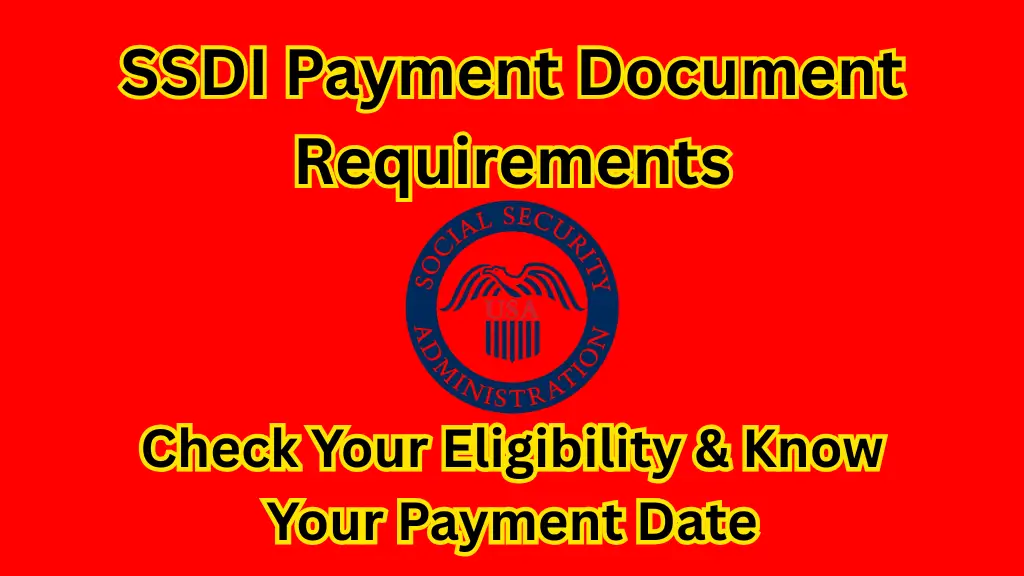Essential Documents for a Successful SSDI Application
SSDI Payment Document Requirements: Applying for Social Security Disability Insurance (SSDI) benefits can be a life-changing step. However, having the proper documentation is crucial for a smooth and successful application. This guide outlines the key documents required, tips to keep your application organized, and insights to help you navigate the process with confidence.

1. Identity & Citizenship Proof
Before you submit your SSDI application, ensure you have the following:
- Social Security Number (SSN): Secure your Social Security card or official SSN record. This document is fundamental to linking your work history and verifying your identity.
- Proof of Birth: A birth certificate or legally recognized document that confirms your date of birth.
- Citizenship/Immigration Documents: Depending on your status, you may need a U.S. passport, naturalization certificate, or permanent resident card. These documents confirm your eligibility to receive federal benefits.
2. Employment & Earnings Records
A vital component of your SSDI application is showing that you’ve contributed to the system through work. Gather:
- W-2 Forms and Tax Returns: These documents validate your employment history and earnings. If you are self-employed, your tax returns serve as proof of your contributions.
- Employment Records: Pay stubs and detailed work history can further support your claim by demonstrating your long-term work record.
3. Medical Evidence & Treatment Records
The heart of your SSDI application is proving your disability. Prepare the following:
- Medical Reports and Records: Obtain comprehensive documentation from your healthcare providers. This includes diagnostic test results, treatment records, and detailed reports from specialists.
- Physician Statements: Letters or reports from doctors explaining your condition and how it limits your daily activities are crucial. Consistency and detail in these documents can significantly impact your case.
- Ongoing Treatment Evidence: Keep records of all treatments, prescriptions, and hospital visits. Consistent, up-to-date treatment documentation shows the severity and persistence of your disability.
4. Application Forms & Supporting Paperwork
Completing the correct forms is essential:
- SSDI Application Form (SSA-16): Fill out this form accurately, providing all requested information about your identity, work history, and medical condition.
- Direct Deposit Details: For quicker benefit payments, include your bank account and routing numbers.
- Additional Supporting Documents: Depending on your situation, you may also need marriage certificates, military discharge papers, or additional legal documents if applying for family benefits.
Tips for a Smooth SSDI Application Process
- Keep Originals or Certified Copies: The SSA typically requires original documents or certified copies. Photocopies might not be accepted.
- Stay Organized: Create a checklist of all required documents and keep digital as well as physical copies for easy access.
- Double-Check Consistency: Ensure that all the information across your documents is consistent. Inconsistencies can delay your application.
- Seek Professional Help if Needed: If you’re uncertain about any part of the process, consider consulting with a disability benefits specialist or attorney.
- Read Also:
- How SSDI Recipients Will Qualify For 1 april,2025 Raise?
- SSDI Approval Rate by Age: Trends and Factors Influencing Decisions
Frequently Asked Questions
Q1: What happens if I can’t provide all original documents?
A1: The SSA may accept certified copies from the issuing agency. However, original documents are preferred, so check with your local SSA office if you have concerns.
Q2: Do I need to submit all work-related documents if I’ve been self-employed?
A2: Yes, if you’re self-employed, your tax returns and any available records of self-employment earnings are crucial to validate your work history.
Q3: How often do I need to update my medical records?
A3: Always provide the most current treatment records and diagnostic reports. Regular updates can strengthen your claim by reflecting the ongoing impact of your disability.
Q4: Can missing documents delay my SSDI application?
A4: Absolutely. Missing or inconsistent documentation can lead to delays or even denial of your claim, so ensure you gather all necessary paperwork before applying.
As a finance news writer at sirfal.com, I specialize in breaking down complex economic trends, market updates, and investment strategies into clear, actionable insights. My mission is to empower readers with the knowledge needed to make informed financial decisions. Thank you for engaging with my articles; I hope they add value to your financial journey.